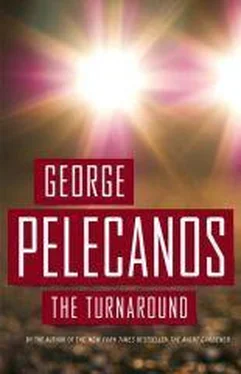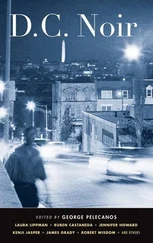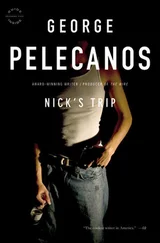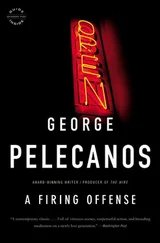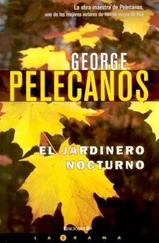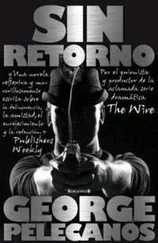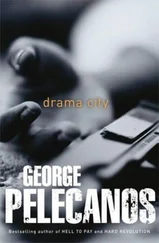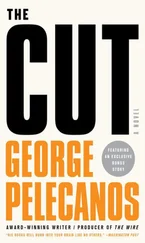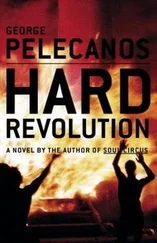George Pelecanos - The Turnaround
Здесь есть возможность читать онлайн «George Pelecanos - The Turnaround» весь текст электронной книги совершенно бесплатно (целиком полную версию без сокращений). В некоторых случаях можно слушать аудио, скачать через торрент в формате fb2 и присутствует краткое содержание. Жанр: Криминальный детектив, на английском языке. Описание произведения, (предисловие) а так же отзывы посетителей доступны на портале библиотеки ЛибКат.
- Название:The Turnaround
- Автор:
- Жанр:
- Год:неизвестен
- ISBN:нет данных
- Рейтинг книги:3 / 5. Голосов: 1
-
Избранное:Добавить в избранное
- Отзывы:
-
Ваша оценка:
- 60
- 1
- 2
- 3
- 4
- 5
The Turnaround: краткое содержание, описание и аннотация
Предлагаем к чтению аннотацию, описание, краткое содержание или предисловие (зависит от того, что написал сам автор книги «The Turnaround»). Если вы не нашли необходимую информацию о книге — напишите в комментариях, мы постараемся отыскать её.
The Turnaround — читать онлайн бесплатно полную книгу (весь текст) целиком
Ниже представлен текст книги, разбитый по страницам. Система сохранения места последней прочитанной страницы, позволяет с удобством читать онлайн бесплатно книгу «The Turnaround», без необходимости каждый раз заново искать на чём Вы остановились. Поставьте закладку, и сможете в любой момент перейти на страницу, на которой закончили чтение.
Интервал:
Закладка:
“The three geniuses. What’re you gonna do?”
“Knock down old ladies and steal their purses.”
“You.” Alex didn’t have to look in the bathroom to see the small wave of his father’s hand.
“I won’t be late,” said Alex, anticipating the next question.
“Who’s drivin?”
“Pete’s got his father’s car.”
“Idiots,” muttered his father, and Alex continued down the hall.
His mother, Calliope “Callie” Pappas, sat in the kitchen at the oval eating table, talking on the phone while she smoked a Silva Thin Gold 100. Her eyebrows were tweezed into two black strips, her face carefully made up, as always. Her hair had recently been frosted at Vincent et Vincent. She wore a shift from Lord and Taylor and thick-heeled sandals. Second generation, she cared about fashion and movie stars, and was less Greek than her husband. Their house was always clean, and a hot dinner was always served promptly. John Pappas was the workhorse; Callie kept the stable clean.
“Goin out, Ma,” said Alex.
She put her hand over the speaker of the phone and tapped ash into a tray. “To do what?”
“Nothin,” said Alex.
“Who’s driving?”
“Pete.”
“Don’t drink beer,” she said, as a horn honked from outside. She gave him an air kiss, and he headed for the door.
Alex left the house, a small brick affair with white shutters on a street of houses that looked just like it.
Billy and Pete had bought a couple of sixes of Schlitz up at Country Boy in Wheaton. They held open cans between their legs as Alex got into the backseat of the Olds. Billy reached into the bag at his feet and handed a can of beer to Alex.
“We’re way ahead of you, Pappas,” said Pete, lean, blond, agile, and tall, a Protestant white boy among ethnics in the mostly working-to-middle-class area of southeastern Montgomery County. His father was a lawyer. The fathers of his friends worked service and retail jobs. Many of them were World War II veterans. Their sons would grow up in a futile, unspoken attempt to be as tough as their old men.
“Drink up, bitch,” said Billy, broad of shoulder and chest. He carried a shadow of a beard, though he was only seventeen years old.
Billy and Pete usually swung by Alex’s last, so they could commandeer the front seat. It was understood that Alex was not the lead dog in this particular pack. He was somewhat smaller than they were, less physically aggressive, and often the butt of their jokes. They were not cruel to him, exactly, but they were often condescending. Alex accepted the arrangement, as it had been this way since junior high.
Alex pulled the ring on the Schlitz and dropped it into the hole in the top of the can. He drank the beer, still cold from the coolers of the store they called Country Kill.
“You guys got any reefer?” said Alex.
“Bone dry,” said Pete.
“We’re gettin some tomorrow morning,” said Billy. “You in?”
“How much?”
“Forty for an OZ.”
“ Forty? ”
“It’s Lumbo, man,” said Pete. “My guy says it’s prime.”
“Not like that Mexican ragweed you buy from Ronnie Leibowitz.”
“Hebe-owitz,” said Billy, and Pete laughed.
“I’m in,” said Alex. “But, look, pull over soon as you get off my street.”
Pete curbed the Olds and let it idle. Alex produced a film canister that held a thimble-sized portion of pot. “I found this in my drawer. It’s a little stale…”
“Gimme that shit,” said Billy, who took the canister, looked into it, and shook it. “We can’t even roll a J with this.”
Pete pushed the lighter in on the dash. When it popped back out, he pulled it and Billy immediately dumped the small amount of reefer onto the lighter’s orange coils. They took turns snorting the smoke that rose off the hot surface. It was only enough for a headache, but they liked the smell.
“Where we goin?” said Alex.
“Downtown,” said Pete, turning the car onto Colesville Road and driving south for the District line.
Billy pulled a Marlboro from a pack he had slipped behind the sun visor and fired it up. The windows were down and the warm night air flowed into the car, blowing back their hair. They all wore it long.
The car was a white-over-blue Cutlass Supreme. Because of the color scheme, and because it was not the 442, Billy often needled Pete about the vehicle, saying it was a car for “housewives and homos.”
“What,” said Billy, “did your mother pick this out while your father was at work?”
“Least we own it,” said Pete. Billy’s father, a Ford salesman at the Hill and Sanders showroom in Wheaton, brought home loaners. Pete’s father was an attorney for the UAW, a “professional,” which Pete never tired of mentioning to his friends. Pete got good grades and had recently scored well on the SATs. Billy and Alex were C students and had no special plans. They had gotten high and drunk the night before the test.
The boys argued over the choice of radio stations all the way down 16th Street. Alex wanted to listen to WGTB, the progressive FM station coming out of Georgetown U’s campus, but Billy blew that idea off.
“He’s hoping they play Vomit Rooster,” said Billy.
“ Atomic Rooster,” said Alex.
“Nights in White Satin” came on the radio, but Billy switched it because they weren’t stoned. He switched off another station that was playing that Lobo song about the dog and stayed with another one only long enough to change the words of the Roberta Flack hit to “The first time ever I sat on your face.” Billy found a station that was spinning music with guitars and let it ride. They listened to singles by T-Rex, Argent, and Alice Cooper, and when “Day After Day” came on, Billy turned it all the way up. They were down near Foggy Bottom by the time the song had finished. Pete found a place to park.
They walked to a nightclub owned by Blackie Auger. They weren’t old enough to drink, but all of them had draft cards they had bought from older guys in the neighborhood. The doorman had a look at them, saw three guys in jeans from the working-class side of the suburbs, and balked at letting them in. But Alex talked them through the door by saying he knew Blackie, the legendary Greek restaurateur and bar owner. Alex did not know Auger and neither did his parents. In fact, he was in an entirely different class of Greek American and had never come in contact with him. Alex’s family attended “the immigrant church” on 16th Street, while Auger and others of his standing were members of the “uptown” cathedral at 36th and Mass.
The doorman let them pass. The chance that the kid might be telling the truth was their ticket in.
They knew they were out of place as soon as they entered the club. The men were in their twenties and wore stacks and tight double-knit trousers, with rayon big-collared shirts opened to expose chest hair, medallions, crucifixes, and gold anchors. The women wore dresses and did not look their way. Those on the dance floor seemed to know the current steps. Alex, Billy, and Pete could do stuff they’d seen on the Soul Train dance line, but that was all. Their stay was cut short when a guy with a dollar sign for a belt buckle said something to Billy about being “in the wrong club,” and Billy, who was smoking a Marlboro at the time, said, “Yeah, I didn’t know this was a fag bar,” and flicked his live cigarette off the dude’s chest. The same doorman who had let them in told the boys to get out and “don’t never” come back.
“Don’t never,” said Pete, out on the sidewalk. “Dumbass used a double negative.”
Billy and Alex didn’t know what Pete meant, but they figured it was something about Pete being smarter than the bouncer. Being tossed had been momentarily embarrassing, but none of them felt bad about it for long. It had been fun watching the sparks fly off that dude’s chest, hearing Billy’s cackle of a laugh as the guy balled his fists but didn’t step forward, Billy not giving a good fuck about anything, which was his way.
Читать дальшеИнтервал:
Закладка:
Похожие книги на «The Turnaround»
Представляем Вашему вниманию похожие книги на «The Turnaround» списком для выбора. Мы отобрали схожую по названию и смыслу литературу в надежде предоставить читателям больше вариантов отыскать новые, интересные, ещё непрочитанные произведения.
Обсуждение, отзывы о книге «The Turnaround» и просто собственные мнения читателей. Оставьте ваши комментарии, напишите, что Вы думаете о произведении, его смысле или главных героях. Укажите что конкретно понравилось, а что нет, и почему Вы так считаете.
